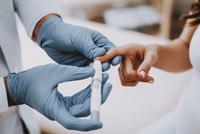This new partnership between the Association for Diagnostics & Laboratory Medicine (formerly AACC), the Centers for Disease Control and Prevention (CDC), and the CDC Foundation aims to reduce the high mortality rate seen from cardiovascular disease in resource-limited countries by expanding patient access to lipid testing in these areas.
 Lipid testing—which is used to assess a person’s risk of developing cardiovascular disease—plays a critical role in detecting this condition early, enabling patients to get timely, effective treatment. However, the quality of testing that patients have access to in resource-limited countries varies greatly based on location. In these regions, well-equipped and well-organized laboratories oftentimes exist alongside those with out-of-date instruments and technicians who have not received the appropriate training—and certain remote areas do not have easy access to laboratory testing at all.
Lipid testing—which is used to assess a person’s risk of developing cardiovascular disease—plays a critical role in detecting this condition early, enabling patients to get timely, effective treatment. However, the quality of testing that patients have access to in resource-limited countries varies greatly based on location. In these regions, well-equipped and well-organized laboratories oftentimes exist alongside those with out-of-date instruments and technicians who have not received the appropriate training—and certain remote areas do not have easy access to laboratory testing at all.
The the Association for Diagnostics & Laboratory Medicine (ADLM)-CDC collaboration will help tackle this problem by improving the capacity of resource-limited countries to perform point-of-care lipid testing—which is testing that can be conducted wherever the patient is, making it ideal for areas with no central laboratory. Working closely with national clinical chemistry societies in the Latin America and Caribbean and Asia-Pacific regions, the partnership will provide new, state of the art point-of-care lipid testing devices to remote sites in these regions and will then train and evaluate local lab professionals on the use of these devices.
Financial support for this work is provided through the CDC Foundation with support from Amgen.
Additional Resources on Point-of-Care Testing and Cardiovascular Disease
ADLM Resources
Other Resources